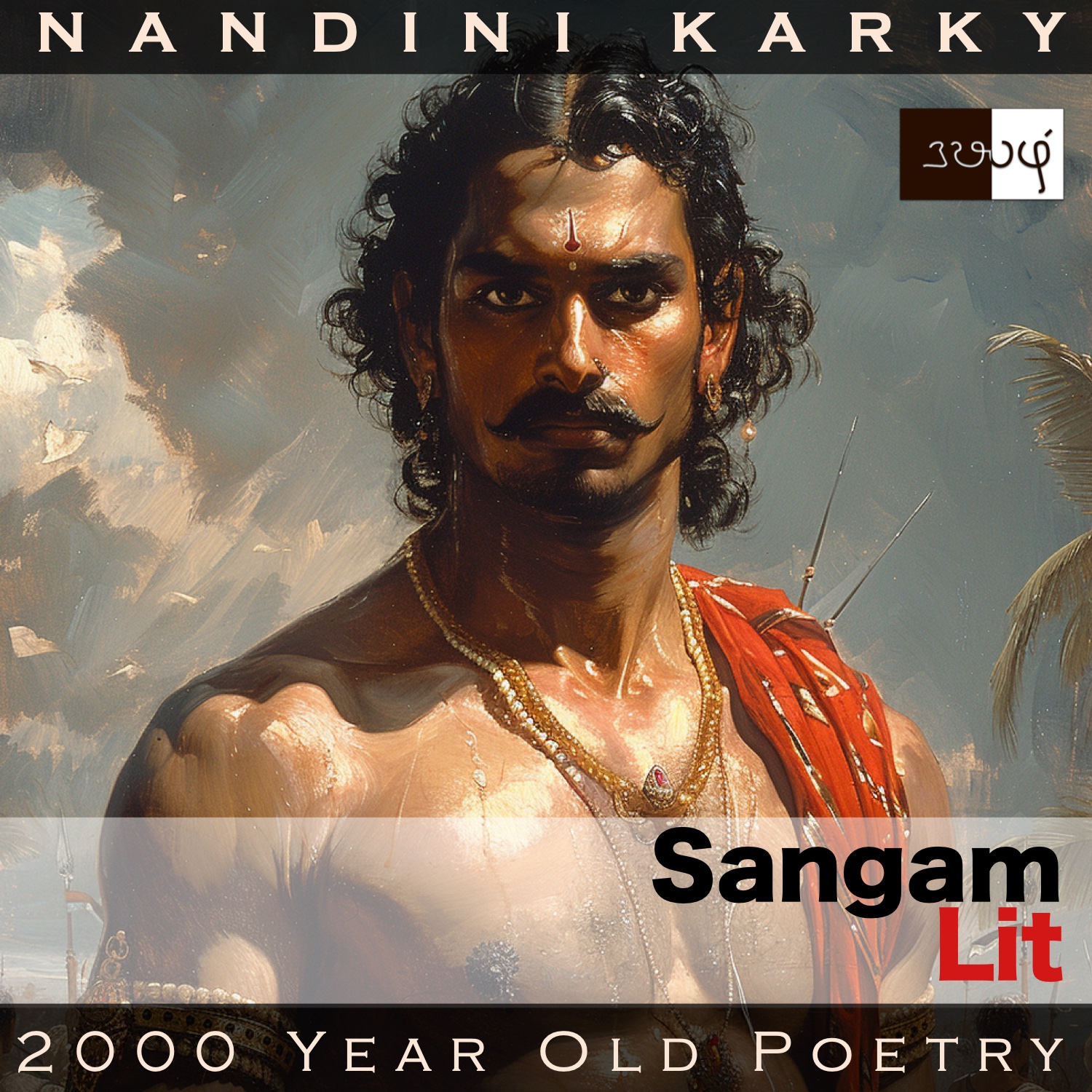Podcast: Play in new window | Download
Subscribe: Apple Podcasts | Spotify | Amazon Music | Android | iHeartRadio | TuneIn | RSS | More
In this episode, we listen to the greatness of a king in war and peace, as depicted in Sangam Literary work, Puranaanooru 392, penned about the Velir King Poguttu Ezhini by the poet Avvaiyaar. The verse is situated in the category of ‘Paadaan Thinai’ or ‘Praise’ and reveals a fascinating fact in the history of agriculture.

மதி ஏர் வெண் குடை அதியர் கோமான்,
கொடும் பூண் எழினி, நெடுங் கடை நின்று, யான்
பசலை நிலவின் பனி படு விடியல்,
பொரு களிற்று அடி வழி அன்ன, என் கை
ஒரு கண் மாக் கிணை ஒற்றுபு, ‘கொடாஅ,
உரு கெழு மன்னர் ஆர் எயில் கடந்து,
நிணம் படு குருதிப் பெரும் பாட்டு ஈரத்து
அணங்குடை மரபின் இருங் களந்தோறும்,
வெள் வாய்க் கழுதைப் புல் இனம் பூட்டி,
வெள்ளை வரகும் கொள்ளும் வித்தும்
வைகல் உழவ! வாழிய பெரிது!’ எனச்
சென்று யான் நின்றனெனாக, அன்றே,
ஊர் உண் கேணிப் பகட்டு இலைப் பாசி
வேர் புரை சிதாஅர் நீக்கி, நேர் கரை
நுண் நூல் கலிங்கம் உடீஇ, ‘உண்’ எனத்
தேள் கடுப்பு அன்ன நாட்படு தேறல்
கோள்மீன் அன்ன பொலங் கலத்து அளைஇ,
ஊண் முறை ஈத்தல் அன்றியும், கோள் முறை
விருந்து இறை நல்கியோனே அந்தரத்து
அரும் பெறல் அமிழ்தம் அன்ன
கரும்பு இவண் தந்தோன் பெரும் பிறங்கடையே.
The words of the prolific and peerless female poet Avvaiyaar resound in this verse sung not about her best friend and king Athiyamaan but about Athiyamaan’s son, Poguttu Ezhini. Here, she assumes the voice of a male drummer to convey the essence of this king’s generosity effectively. Her words can be translated as follows:
“With a royal, white umbrella, akin to the moon, rules the king of Athiyars, Ezhini, the one wearing curvy garlands of gold. Standing at his wide gates, as the young moon sheds its misty dew in the morning hours, I beat on the eye of my huge kinai drum, shaped like the footprint of a battle elephant, and sang, ‘Conquering the formidable walls of terrifying kings, who had refused to render, in that huge battlefield made moist with flowing blood, filled with fatty flesh, you would tie white-mouthed, dull-hued donkeys to a plough and sow white millets and horse gram day after day, like a farmer, O lord! May you live long!’.
As I sang so and stood there, right that moment, he appeared and removed my garment, torn and stained like the roots of the wide-leafed moss that spreads on the drinking water tanks in the village, and rendered unto me, a neatly cut attire made of fine threads. Then, saying ‘Eat’, he gave me a long-fermented distillation of toddy, with a scorpion’s sting, in a golden bowl, akin to the planets in the sky. The way he rendered was not merely as per the tradition of giving food to another, but going further, he rendered a feast unto me with perfect hospitality! He is the scion in the line of that great ancestor, who, from a place that was beyond, brought that hard-to-obtain ambrosia called sugarcane!”
Time to explore the nuances. The poet starts in the voice of a male drummer and talks about the famous rule of Ezhini, by referring to his royal umbrella as the moon. The drummer describes how he stood at the gates of this king and sang about the king’s prowess in the battlefield and the way he ploughs it with donkeys, sowing millets and horse gram, something which sounds curious to our ears but could be an age-old tradition of insulting the enemies in the battleground. Immediately after this song, the king seems to have summoned the drummer and then seeing the stained, moss-like garments, gave him fine clothes. After that, toddy of the best possible quality, something that had been fermented for many days to give it the sting of a scorpion, was given to him, in a golden bowl that shone like a planet in the sky, says the drummer. He then summarises how the king did not do these things merely out of tradition but he could sense the true hospitality in the king’s manner of giving. Finally, the poet concludes in the voice of this drummer saying that this king is one who comes in the great lineage of that famous king, who had brought the delicious ambrosia on earth called sugarcane from far beyond to this land.
That single line is the highlight of this verse, which otherwise contains the usual descriptions of war and generosity. When I searched about the history of sugarcane, I learnt that it came from the Austranesian lands of Papua New Guinea to India around 1000 BCE, and only from here, it travelled to regions as far as Greece and Rome. The lines of this verse tells us that it was the ancestor of this king who brought sugarcane from far beyond. This ‘far beyond’ could be ‘beyond the seas’ and behind this one line, rests so much history about agriculture,maritime trade and commerce between regions, separated by more than 7000 kilometres, three thousand years ago. Sadly, the rich history of the people in these regions have been swept away in the current of colonialism because of the mistaken branding of these cultures as ‘primitive’. Hope such striking words that speak to us will inspire future generations to uncover such unsung glory of the past!




Share your thoughts...